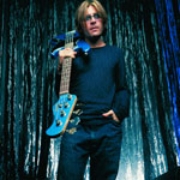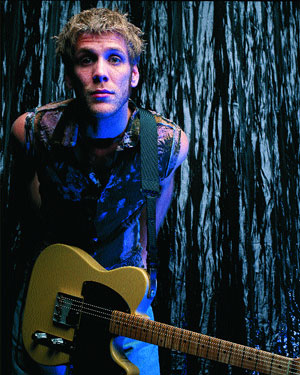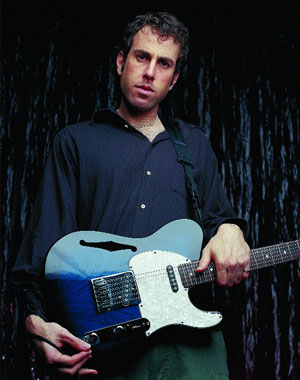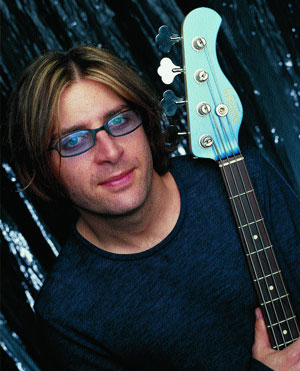

You may well not have heard of Matchbox Twenty unless you hang out in America. If you do know this band, you could well view the trio interviewed here - guitarists Kyle Cook and Adam Gaynor and bass player Brian Yale - as the kind of irony-free, American MTV fodder who'll sell their last vestage of musical integrity to 'make it'.
After all, how does a band that gets together just three months before recording their first album, 'Yourself Or Someone Like You' then go on to sell 10 million copies of it? And how does their lead singer, Rob Thomas, subsequently end up collaborating with Carlos Santana on The Supernatural, worldwide supersmash of a few months ago? It's all a bit too unlikely isn't it? And surely not the result of being anything but desperate for commercial success.
As it turns out, Guitarist's Matchbox Twenty guests prove disarmingly dry of wit, resolutely un-pop starry and unquestionably committed to the art of crafting songs. Pretentious they are not. Their massive success has come about with little critical support, in the US, because they write songs that people have simply come to love. And in the case of new album, 'Mad Season By Matchbox Twenty' they've done it again.
They may not have the angsty edginess of a new Nirvana or the painfully hip posturing of another Limp Bizkit, but then Matchbox Twenty have never made any secret of the fact that it's melody, not mindless band-wagoneering, that cranks their collective handle.
Their success has yet to translate into European, of course. But this hasn't stopped the Matchbox boys repeatedly taking on the UK over the last few years. The fact that the band comfortably sold out Hammersmith Apollo, the location for this interview, on their most recent jaunt, reflects their steadily increasing British popularity - heartening when you consider the relatively low profile they've received in the press.
They may have made it big in the US overnight, but this is a band who know they have to prove themselves elsewhere. The only way they're going to do that is by playing. And playing, and playing...
 Selling out the Hammersmith Apollo is no mean feat, but I guess you're used to playing bigger places back home?
Selling out the Hammersmith Apollo is no mean feat, but I guess you're used to playing bigger places back home?
Cook: It's a humbling experience playing in Europe. We're still trying to make people aware of the band, let alone the new record. It's very different than at home.
Gaynor: It really makes us concentrate on not just coasting through the show. I think, in the States, we're known for putting on a pretty good show every night. But when we come here, we really need to focus on making sure that it's happening every time we get on the stage. It's been nine months since we played live, so it feels good to be playing in front of an audience again. And the break has made us enjoy the first few dates of the tour, which makes us play better, so it's all been good.
Cook: We'd worked so hard for the two years before that though, we needed to have some time off, some sacred time for ourselves. But for me personally, it felt great to get back with the guys. Even doing pre-production rehearsals for this tour was really fun, because we were together, playing again.
Gaynor: A couple of us really like to play live and a couple of us like the studio more, but I think we'd all agree that we love the rush of playing for people that appreciate what we do. And each time we come over to the UK, there have been more people coming to see us, which is great.
It has been a lengthy old break between the end of the mammoth first album tour and this new album, but how long did it actually take to write?
Cook: Rob wrote the songs, so he'd have to answer how long the process of writing everything took, but as far as recording is concerned I guess it was four or five months. We got two different demos of the potential tunes, one with piano and one with guitar, with Rob singing of course. We started pre-production for the album a couple of months after that.
That's the point at which we come in as a band and choose which songs we're going to do, normally with Matt Serletic our producer. We sit and thrash that out and at the same time we arrange the songs, come up with the odd bridge and generally get things into shape. Sometimes we'll get a song brought in that is just a verse and a chorus, which might be a minute and a half long, and other times it might be a much more complete version where we just have to work out what our own input is going to be.
Gaynor: The songs are like diamonds in the rough at that point - basic versions, with Rob singing and playing guitar chords. There are no counter-melodies, no other instrumentation. In Rob's mind it's probably about three-quarters done. So Rob will refine things as we all pitch in ideas and come up with the bridges and whatever.
And what determines if a song is worth working with and developing from an early demo?
Cook: When we're choosing songs we really just listen for strong melodies. And if we can hear what we'd play as a band behind Rob's melody line, quickly, the song tends to stay. It's really all about supporting the melody with this band. Rob is so brilliant at writing great melodies. Our job is to make the most of them. 'Mad Season By Matchbox Twenty' is a much bigger, more complex record than 'Yourself Or Someone Like You.'
Can you pinpoint what made the new album turn out the way it did?
Gaynor: When we made the first album we'd been together three months. With this one, we'd been around the world, played together, slept together... er, in a sense! We'd matured together over the course of 500 shows or whatever. So we went into the studio knowing that different people had things to contribute this time. For the first album, we really didn't know what each of us was about. So it was a different process with this record. The next one will probably be as melodic as this one, but will probably have a completely different angle again. I really don't know if we'll have our sound down until the fourth or fifth record really.
Cook: We explored the arrangements a lot more this time, and spent time trying to build interest from the beginning to the end of the songs. We listened to a lot of Beatles stuff and ended up using a lot of three part harmonies as a result. Things like that add up to make a much more interesting, dynamic record I think.
And what did you two in particular bring to the songs?
Gaynor: Kyle and I bring a lot of layering and harmonic ideas to the band. Whether that's vocals or guitars or whatever.
Cook: Yeah, that's definitely true - a lot of the density of the arrangements comes from the two of us. And the nine months off gave us a chance to explore music, which I think meant we all came back with different influences which was interesting. I bought a load of stuff and stayed home and played keyboards and drums. That really influenced how I approached the songs on the new record.
Given that you sold gazillions of copies of the first album, how do you think this one's going to do for you?
Cook: I've always had the feeling that we might do better internationally with 'Mad Season' than we did with the first record. But really there's absolutely no way of knowing.
 Did the fact you hit the 10 million mark with your debut suprise you?
Did the fact you hit the 10 million mark with your debut suprise you?
Gaynor: I always say that I knew we'd sell four million records.
That's an awful lot of albums for a new band.
Gaynor: Yeah, but when I turned up for the Matchbox Twenty audition I wasn't even sure if I wanted the job, until I heard Rob's songs. I loved them. And I thought if I love them, then other people will love them and, as long as the machinery - the record company and everything - behind you is working well in terms of promotion and stuff to break you into the market, then I thought we'd do okay. But I didn't think it would go quite as crazy as it did. It's been a lot of work and a lot of luck. There are a lot of bands like us that do similar stuff to us and haven't sold as well as we have. And there's no way of figuring out why that happens.
The monster success of the first record must have created a fair bit of pressure when it came to trying to follow it up.
Cook: I certainly felt some pressure to live up to the first record, because we'd built this monster. History shows that when you've had a huge first record it's difficult to top it. But we didn't change the way we wrote or anything.
Gaynor: Worrying about it wasn't going to help us.
And how do you think it's doing for you? What's the feeling at the moment from the press and fans?
Cook: Well at the moment everybody's still asking us about Rob's record with Santana, which is getting kind of old now. But there's no escaping that that record has helped us to reach a new audience, and people are coming to check us out now who wouldn't have done before.
Gaynor: We never get any critical acclaim anyway and that hasn't really changed with the new album. To be fair, we have had some good press. Though we've never been critically acclaimed, as it were. We're really not worried about that, as long as the fans get into it. And they seem to be.
Cook: I think as far as the press are concerned, bands that are about songs, over and above everything else, tend not to get the rave reviews that certain others do. But I think the fact that this record is a little bit darker than the first one, and the fact that we've explored more musical ground than before, means we're more likely to win the press over a little bit. Having said that, it's really not important to us what they think, like Adam said, it's the fans who we're trying to reach, not
the media.
As far as guitar arrangements go with Matchbox 20 songs, how do you divide up who plays what? Does one of you always take the clean part and the other one the crunchy stuff?
Gaynor: Yes and no. Kyle's a lead player more than me so he takes care of a lot of the intricate picking parts and solo lines. I tend to play more acoustic, but a lot of times we both share sounds and tones and things.
Cook: Adam ends up being a lot of the depth in the songs, implying chord changes and stuff.
What gear do you rely on to recreate the sounds and tones from the studio?
Cook: We're using Budda amps from this little company who I think might be based in Atlanta. I started using them a couple of years ago. I really like them. They have a kind of vintage feel about them - there's not tons of distortion with those amps. And we've both got Bradshaw switching systems and TC Electronics processors.
Gaynor: I'm kind of between rigs. I'm using the Budda stuff too, like we did in the studio. And I've got a Roland JC120 for clean stuff. And guitar-wise I'm primarily using G&Ls and Paul Reed Smiths.
Cook: I'm still using a lot of Fender stuff. I've got a Danny Gatton signature Tele that we used a lot on the record, but I also use a PRS a lot live. The craftsmanship of those guitars is just amazing.
 Brian, it's not just the guitars that feature a carefully thought out, heavily produced feel on the new record - your bass sound changes a lot too. Did you end up using a lot of different instruments in search of the perfect vibe for each?
Brian, it's not just the guitars that feature a carefully thought out, heavily produced feel on the new record - your bass sound changes a lot too. Did you end up using a lot of different instruments in search of the perfect vibe for each?
Yale: Oh yeah, there are a few different basses on there. On the first album I mainly used my Music Man StingRay with Eden amps - the guys at Ernie Ball have been so nice to me, they've given me so many of those things. I used various different StingRays on the new record. Apart from them I also used my Fender Jazz with flatwound strings, for a couple of the thuddier songs, to get that total seventies smoky club, James Jamerson vibe. I've got a great Sadowsky that I use live too.
And you're a confirmed four-stringer?
Yale: I am really. One of the StingRays I strung up with a low B, and then E, A and D to get that low five string thing without having to deal with a bigger neck. And it sounded cool, so I still use that bass like that now. I'm not really a five string kind of a guy, but I use a lot of drop D tuning, because it seems to work really well with Rob's vocal range. So the low strung five, which I use for Black And White People is a good way of getting the best of both worlds.
And there are a few effecty things on there too by the sounds of it.
Yale: There are a couple of tunes that have a few effects on and I've got a selection of pedals that I use live to recreate them. In my rig right now I've got three distortion pedals and an Expandora that I use on Busted, from the first record. I use that in combination with a dbx octave divider which gives me an octave down. That's really useful, because I can switch on the distortion but still have a solid low end going on. If you just kick in distortion on the bass it can sometimes get kind of middly and you lose that deep low end. So the dbx works really well for me on stage. Then I've got a SansAmp in the rig and a couple of chorus pedals - a TC Electronic pedal and a Boss Super Chorus that's set-up for the bridge of Bent. That's interesting actually, because in the studio we got this crazy sound with a TC Electronics G-Force rack processor where I played two notes and the G-Force did this weird pitch-shifting thing almost like a Whammy pedal. So I simulate that live with a chorus pedal and the dbx.
And you pump all this through quite an extensive live rig don't you?
Yale: I've got three Eden World Tour 800 amps for these shows. I use them in bridged mono, so I put the whole signal through the whole rig. I'm not a big fan of that bi-amped sound, it really doesn't work for me. I'd rather have a full-range signal going to all the speakers. I don't use any EQ, so I get this big, massive punch. It's basically 1500 watts going into one cab, which sounds great and means we don't actually have to turn them up very loud. So I have two heads with one back-up and a 1000 watt Eden power amp which powers an Iso-box off stage. In the States I generally have another stack on Kyle's side of the stage. That's kind of for the look of things, but it means that wherever I am on stage, I can just lean back a little and feel the bass, it's something you miss with the in-ear monitors that we use.
Do the cabs contain a mixture of 10-inch and 15-inch speakers, or do you have a preference for one over the other?
Yale: The cabs are all 4x10-inches. When I was in college I used to use a Gallien-Krueger head with a Hartke 4x10-inches and a 1x15-inch and I liked the sound of that, but these Edens really reproduce the low end well. They're really fat down there, but really tight too. Whether that's the porting of the cabinets or whatever I don't know but it really works. It's a very high-fidelity, amazing full frequency sound and I noticed a huge difference when I moved over to Eden and the StingRay. It was like night and day. But it really revealed any sloppiness in my playing, maybe because the speakers react so quickly and are more sensitive than what I had before. I'm not positive, but it definitely made a tangible difference. And it certainly made me play better. Well, that and the 500 shows.
You've got a good few gigs in Europe to look forward to. But isn't there a temptation just to play places like Australia, the US and Canada, where you're already really big? Is it really that important to be successful over here?
Cook: It's really important to me, personally, to do well in England, because I love a lot of English music. I mean obviously there's the Beatles and the whole heritage that this country has, but new stuff like the last Supergrass album is amazing. I love that record, although I guess it just goes over the heads of a lot of Americans, the Foo Fighters aside.